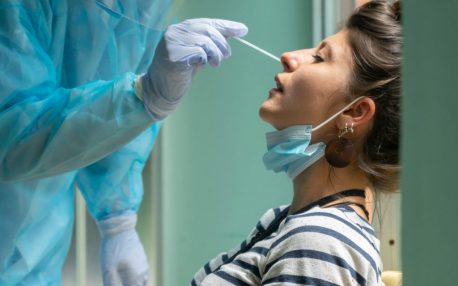
Why COVID-19 screening and testing are important for developing a highly effective vaccine.
President Trump recently stated that he is “immune” from COVID. However, a recent report indicated that it may be possible to be re-infected with variants (types) of severe acute respiratory syndrome coronavirus 2 (SARS-CoV-2) that causes COVID-19. The science is quite clear on this. The possibility of reinfection with SARS-CoV-2 is not well understood. Individuals who recover from COVID-19 should still get screened and tested if they come in contact with an individual who is currently infected.
In a Lancet (a prestigious science journal) paper published October 12th 2020, a 25-year-old Nevada resident had two positive tests for SARS-CoV-2, the first on April 18, 2020, and the second on June 5, 2020 – separated by two negative tests done during follow-up in May, 2020.
Analysis of the virus uncovered genetically significant differences between each variant (type) associated with each instance of infection. This suggests that the patient was infected by SARS-CoV-2 on two separate occasions by a genetically distinct virus. Furthermore, analysis indicated that there was little chance that the virus mutated within the individual (between the first and second infection) since the mutation rate would have to be that which has not been documented thus far for SARS-CoV-2.
The authors reported limitations to their study, in part, that it was only one occurrence. However, it can be inferred from these findings that initial exposure to SARS-CoV-2 might not result in a level of immunity that is 100% protective for all individuals.
Similar examples of less than 100% vaccine protection have been already established in the public health field. For instance, the flu virus often poses a significant challenge to drug developers every year to design a flu vaccine that can be highly effective in combating influenza. In 2018-2019, the flu vaccine was on average 29% effective in the U.S. population.
To improve the chances that variants of the virus will be tracked, improvements in screening and testing for the presence of SARS-CoV-2 is imperative. Barriers to screening and testing availability for SARS-CoV-2 can exacerbate the response to the COVID-19 pandemic, especially among communities of color and other at-risk groups. Most important, limitations on COVID-19 testing hamper efforts to obtain actionable genetic tracking data that can inform COVID-19 vaccine development.

Anthony Salandy, Ph.D., M.S.
Dr. Salandy is founder of the Institute for COVID-19 Vaccination Advocacy (ICVA). ICVA aims to increase knowledge of the COVID-19 vaccination program, decrease COVID-19 vaccine hesitancy, and improve COVID-19 vaccine coverage around the globe.